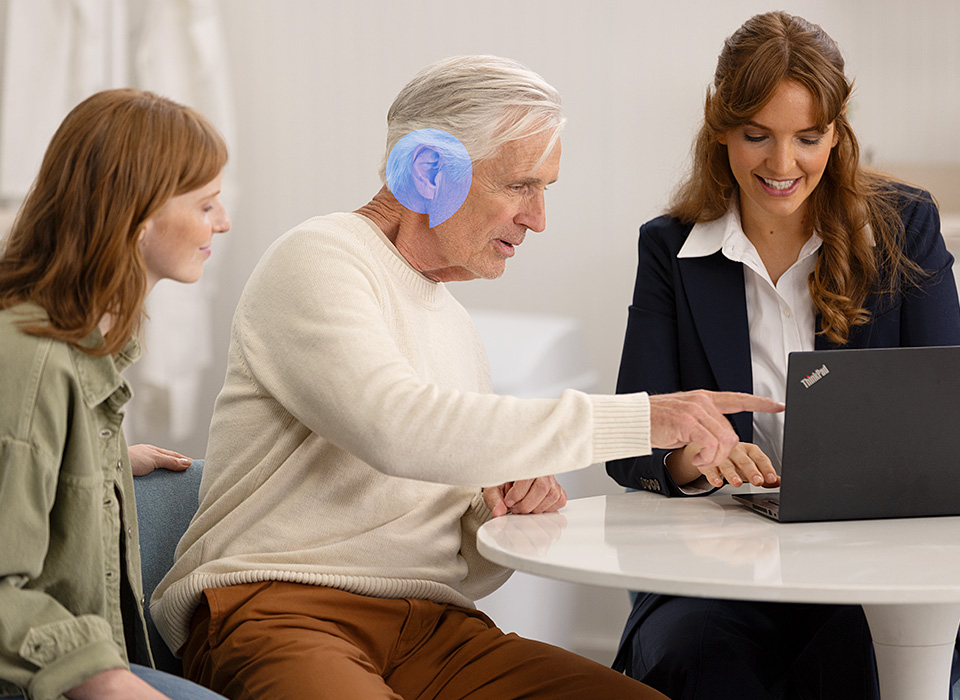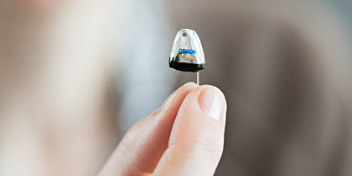Many of our hearing centres are open over Christmas. Check your local centre's opening hours and book your appointment here. Customer service & booking teams will be open on reduced hours.

When is it time to seek help for hearing loss?
Generally speaking, the earlier you seek help for your hearing loss, the more effective your treatment will be. We encourage you to reach out for for help as soon as you notice any early signs of hearing loss. Learn more below.
6 signs you should seek help for your hearing loss
Learn what the signs that you should seek help are.
Signs of hearing loss
Learn how Katie came to accept her hearing loss
“If I was to give someone with hearing loss advice, I would just say life doesn’t stop there – you can do anything.
“If you’re struggling with your hearing, don’t hide behind it – go and get your ears tested because you don’t know what you’re missing out on.”
| Audio | Visual |
| Admitting to yourself that you have a hearing loss is probably the hardest thing. I didn’t start wearing hearing aids until I was about 21 I think. | Caption reads: Katie – model and salon owner. Katie is sitting against a rack of weight bars in a gym. Zoom in on Katie’s head from behind as she’s pulling up her hair into a ponytail so that we can see her behind-the-ear hearing aid. |
| I got given my first pair of hearing aids about 18. | Zoom out – Katie is walking across the gym floor, pausing to pick up a gym bag. |
| These hearing aids that I’ve been given by Hidden Hearing, they’re just amazing. | Katie is sitting against a rack of weight bars in the gym |
| The technology is incredible. | Zoom in on Katie’s head from behind as she’s pulling up her hair into a ponytail so that we can see her behind-the-ear hearing aid. |
| Now, they are just so, so small for the power that they have; they’re incredible really. They’re literally minute and they sit right behind my ear, so even if I was to wear my hair up, you can barely even see them, which is brilliant for me. When I went to Hidden Hearing for my hearing test, the test was so thorough, so that was really impressive. | Katie is sitting against a rack of weight bars in a gym, talking to the interviewer who is out of shot. She is removing her hearing aid from her left ear and presenting it to us in the palm of her right hand, to highlight how small it is. She is now putting her hearing aid back in. Katie is jumping up onto a box, stepping down and then jumping back up again. |
| Even now, after 11/12 years I probably would say that I haven’t completely accepted it still, and I don’t think it’s something I ever will. But the more I try to, the easier things become, and the more people you tell, the easier things become as well. If I was to give someone with hearing loss advice, I would just say life doesn’t stop there – you can do anything. | Katie is putting her hands in to a bucket of chalk, now she is lifting a weighted barbell up to her shoulders. Katie is doing chin ups on a bar. Katie is using a cross-trainer bike. |
| It might be a little harder for you, but it will make you a stronger person for it. If you’re struggling with your hearing, don’t hide behind it – go and get your ears tested because you don’t know what you’re missing out on. | Katie is dropping a weighted barbell, is climbing a rope in the gym and is skipping using a skipping rope. |
| For more information on Hidden Hearing, visit their website. | The screen fades to white and the Hidden Hearing logo appears. |

Self-assessment: Do I need a hearing test?
Just answer the four questions below to see whether you should consider getting a hearing test.
Your Result:
You would benefit from a hearing test
Your answers indicate that you experience symptoms of hearing loss. We strongly recommend booking a hearing test in one of our clinics.
The result is an indication. An in-person hearing test can determine if you have a hearing loss.
Book your free hearing test:
Your Result:
It seems you’d benefit from a hearing test
Your answers indicate that you experience some symptoms of hearing loss. We recommend booking a hearing test in one of our clinics.
The result is an indication. An in-person hearing test can determine if you have a hearing loss.
Book your free hearing test:
Your Result:
It cannot be determined whether you’d benefit from a hearing test
Your answers do not indicate that you experience symptoms of hearing loss. However, if you experience trouble hearing, we recommend booking a hearing test in one of our clinics.
The result is an indication. An in-person hearing test can determine if you have a hearing loss.
Book your free hearing test:

Does hearing loss get worse if left untreated?
If any level of hearing loss is left untreated, the brain gradually loses its ability to process information (due to the lack of auditory stimulation).
This means that the longer you wait to seek treatment, the harder it'll be for your brain to make sense of sounds. And it'll also take longer to get used to wearing hearing aids.
6 benefits of using hearing aids

Treating hearing loss with hearing aids
Most types of hearing loss are treated with hearing aids. For those with more severe hearing loss, there are other options available, such as a cochlear implant or a bone-anchored hearing system.
Hearing aid technology has progressed so much over the past couple of decades, improving the quality of hearing aids themselves and the listening experience for hearing aid users.
4 common myths about hearing loss treatment that are no longer true
When to seek help immediately
If you experience any of the following signs, you should seek medical attention immediately:
- Sudden loss of hearing
- "Stuffy” feeling in the ear
- Dizziness
- Tinnitus or ringing in the ears
- Loud popping sound in the ear followed by hearing loss
Speak to your GP or a medical professional immediately if you experience sudden hearing loss.
Sources
1. https://www.healthyhearing.com/report/46306-Hearing-loss-auditory-deprivation
2. G Livingston, Jonathan Huntley, Andrew Sommerlad, et al. Dementia prevention, intervention, and care: 2020 report of the Lancet Commission. The Lancet. July 30, 2020.
3. MarkeTrak 10, Marketing Research, Inc.
4. https://www.ncbi.nlm.nih.gov/pmc/articles/PMC4111503/
5. https://www.oticon.ca/professionals/products/hearing-aids/opn-ite
6. https://www.healthyhearing.com/report/52638-Top-five-myths-about-hearing-loss
7. Deal JA, Betz J, Yaffe K, et al, for the Health ABC Study Group. Hearing impairment and incident dementia and cognitive decline in older adults: the Health ABC Study J Gerontol A Biol Sci Med Sci 2016; published online April 12. DOI:10.1093/gerona/glw069. 66
8. Lin FR, Metter EJ, O’Brien RJ, Resnick SM, Zonderman AB, Ferrucci L. Hearing loss and incident dementia. Arch Neurol 2011; 68: 214–20. 67
9. Gallacher J, Ilubaera V, Ben-Shlomo Y, et al. Auditory threshold, phonologic demand, and incident dementia. Neurology 2012; 79: 1583–90
10. The National Council on Aging, The Consequences of Untreated Hearing Loss in Older Persons, May 1999. https://www.ncoa.org/wp-content/uploads/NCOA-Study-1999.pdf
11. Beck DL, Clark, JL. Audition matters more as cognition declines and cognition matters more as audition declines. Audiology To-day. 2009;(3):48-59.
12. Jung D, Bhattacharyya N. Association of hearing loss with decreased employment and income among adults in the United States. Ann Otol Rhinol Laryngol. 2012;121(12):771–775. [PubMed]
13. Yuan, J., Sun, Y., Sang, S., Pham, J. H., and Kong, W. J. (2018). The risk of cognitive impairment associated with hearing function in older adults: a pooled analysis of data from eleven studies. Sci. Rep. 8:2137. doi: 10.1038/s41598-018-20496-w















